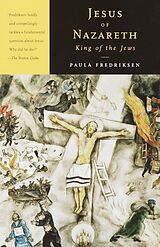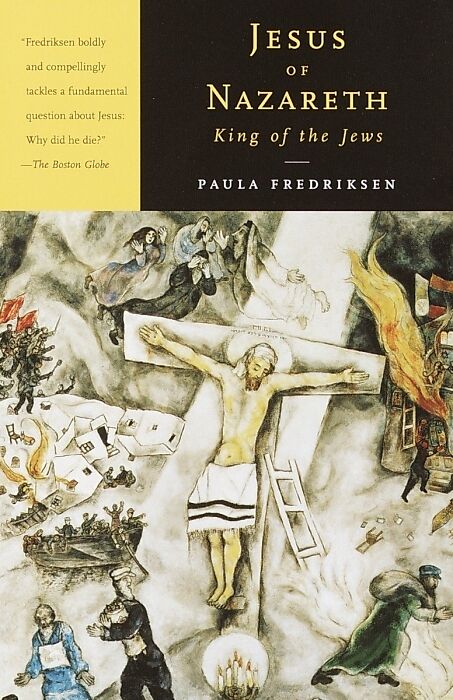Jesus of Nazareth
Einband:
Poche format B
EAN:
9780679767466
Untertitel:
A Jewish Life and the Emergence of Christianity
Genre:
Übrige Sachbücher & Sonstiges
Autor:
Paula Frederiksen
Herausgeber:
Random House N.Y.
Anzahl Seiten:
352
Erscheinungsdatum:
05.12.2000
ISBN:
0679767460
Zusatztext "Tightly reasoned! learned and readable.... Engagingly written."-- National Review "Fredriksen boldly and compellingly tackles a fundamental question about Jesus: Why did he die?"-- The Boston Globe Informationen zum Autor Paula Fredriksen is the Aurelio Professor of Scripture at Boston University. Klappentext Paula Fredriksen, renowned historian and author of From Christ to Jesus , begins this inquiry into the historic Jesus with a fact that may be the only undisputed thing we know about him: his crucifixion. Rome reserved this means of execution particularly for political insurrectionists; and the Roman charge posted at the head of the cross indicted Jesus for claiming to be King of the Jews. To reconstruct the Jesus who provoked this punishment, Fredriksen takes us into the religious worlds, Jewish and pagan, of Mediterranean antiquity, through the labyrinth of Galilean and Judean politics, and on into the ancient narratives of Paul's letters, the gospels, the Dead Sea Scrolls, and Josephus' histories. The result is a profound contribution both to our understanding of the social and religious contexts within which Jesus of Nazareth moved, and to our appreciation of the mission and message that ended in the proclamation of Jesus as Messiah.Introduction: The History of the Historical Jesus Christianity has always been concerned with the historical Jesus. The Gospels present their religious message through the medium of a life story, providing names and dates in their own narratives -- the reign of Herod the Great or Augustus, the tenure in office of Pilate as prefect or Caiaphas as high priest -- that orient their story in the flow of public time. Paul himself, though notoriously unconcerned with Jesus before the Crucifixion as opposed to the Risen and Returning Christ, nonetheless still incorporates a key moment in the life of Jesus into his proclamation when he invokes the teaching about the Last Supper: "On the night when he was handed over, the Lord Jesus took bread, and when he had given thanks he broke it and said, 'This is my body' " (1 Cor 11:23f.). The point, both for the evangelists and for Paul, was that Jesus, his elevated status as Redeemer, Lord, Messiah, or Son of God notwithstanding, had acted and operated in a human context, within human time. Even as formal Christian theology developed and grew, and the language describing the person and work of Christ drew increasingly on the concepts and vocabulary of Greek philosophy, this historical dimension never disappeared. The same bishops who were caught up in endless controversies about the Son and the Trinity, about essences and substances, affirmed their faith in creeds whose content was largely narrative and, thus, historical: "I believe in God . . . and in Jesus Christ his Son our Lord, who was conceived of the Holy Spirit, born of the Virgin Mary, suffered under Pontius Pilate . . ." The modern quest for the Jesus of history -- the project here -- was begun and pursued foremost in the university faculties of post-Enlightenment Germany. In part continuing the Reformation's protest against the theological formulations of Roman Catholicism, in part applying the developing methods of scientific historical research to the documents of the ancient church, German scholars blazed the path for critical work on the life of Jesus. Their efforts ended in an impasse almost a century ago, when these academic portraits of Jesus, sketched primarily from the palette of Mark, Matthew, and Luke, polarized around two options: Jesus imagined essentially as a teacher of religious ethics ("The fatherhood of God and the brotherhood of man"), or Jesus as self-designated apocalyptic Messiah (the hero of Albert Schweitzer's great classic The Quest of the Historical Jesus ). Each interpretation emphasized different aspects of the Gospel tradition: the ethical Jesus, the Sermon on...
"Tightly reasoned, learned and readable.... Engagingly written."--National Review
"Fredriksen boldly and compellingly tackles a fundamental question about Jesus: Why did he die?"--The Boston Globe
Autorentext
Paula Fredriksen is the Aurelio Professor of Scripture at Boston University.
Klappentext
Paula Fredriksen, renowned historian and author of From Christ to Jesus, begins this inquiry into the historic Jesus with a fact that may be the only undisputed thing we know about him: his crucifixion.
Rome reserved this means of execution particularly for political insurrectionists; and the Roman charge posted at the head of the cross indicted Jesus for claiming to be King of the Jews. To reconstruct the Jesus who provoked this punishment, Fredriksen takes us into the religious worlds, Jewish and pagan, of Mediterranean antiquity, through the labyrinth of Galilean and Judean politics, and on into the ancient narratives of Paul's letters, the gospels, the Dead Sea Scrolls, and Josephus' histories. The result is a profound contribution both to our understanding of the social and religious contexts within which Jesus of Nazareth moved, and to our appreciation of the mission and message that ended in the proclamation of Jesus as Messiah.
Leseprobe
Introduction: The History of the Historical Jesus
Christianity has always been concerned with the historical Jesus. The Gospels present their religious message through the medium of a life story, providing names and dates in their own narratives -- the reign of Herod the Great or Augustus, the tenure in office of Pilate as prefect or Caiaphas as high priest -- that orient their story in the flow of public time. Paul himself, though notoriously unconcerned with Jesus before the Crucifixion as opposed to the Risen and Returning Christ, nonetheless still incorporates a key moment in the life of Jesus into his proclamation when he invokes the teaching about the Last Supper: "On the night when he was handed over, the Lord Jesus took bread, and when he had given thanks he broke it and said, 'This is my body' " (1 Cor 11:23f.). The point, both for the evangelists and for Paul, was that Jesus, his elevated status as Redeemer, Lord, Messiah, or Son of God notwithstanding, had acted and operated in a human context, within human time.
Even as formal Christian theology developed and grew, and the language describing the person and work of Christ drew increasingly on the concepts and vocabulary of Greek philosophy, this historical dimension never disappeared. The same bishops who were caught up in endless controversies about the Son and the Trinity, about essences and substances, affirmed their faith in creeds whose content was largely narrative and, thus, historical: "I believe in God . . . and in Jesus Christ his Son our Lord, who was conceived of the Holy Spirit, born of the Virgin Mary, suffered under Pontius Pilate . . ."
The modern quest for the Jesus of history -- the project here -- was begun and pursued foremost in the university faculties of post-Enlightenment Germany. In part continuing the Reformation's protest against the theological formulations of Roman Catholicism, in part applying the developing methods of scientific historical research to the documents of the ancient church, German scholars blazed the path for critical work on the life of Jesus. Their efforts ended in an impasse almost a century ago, when these academic portraits of Jesus, sketched primarily from the palette of Mark, Matthew, and Luke, polarized around two options: Jesus imagined essentially as a teacher of religious ethics ("The fatherhood of God and the brotherhood of man"), or Jesus as self-designated apocalyptic Messiah (the hero of Albert Schweitzer's great classic The Quest of the Historical Jesus). Each interpretation emphasized different aspects of the Gospel tradition: the ethical Jesus, the Sermon on the Mount; the apocalyptic Jesus, those passages on the coming Son …

Leider konnten wir für diesen Artikel keine Preise ermitteln ...
billigbuch.ch sucht jetzt für Sie die besten Angebote ...
Die aktuellen Verkaufspreise von 6 Onlineshops werden in Realtime abgefragt.
Sie können das gewünschte Produkt anschliessend direkt beim Anbieter Ihrer Wahl bestellen.
Loading...
Die aktuellen Verkaufspreise von 6 Onlineshops werden in Realtime abgefragt.
Sie können das gewünschte Produkt anschliessend direkt beim Anbieter Ihrer Wahl bestellen.
| # | Onlineshop | Preis CHF | Versand CHF | Total CHF | ||
|---|---|---|---|---|---|---|
| 1 | Seller | 0.00 | 0.00 | 0.00 |
